How Chess Altered the Course of History: The Butterfly Effect Unveiled
Sep 12th, 2024
Dear readers,
Many of you might already be acquainted with the concept known as the “Butterfly Effect,” a key idea in Chaos Theory. For those who aren’t familiar, I will provide a brief explanation to ensure the following discussion on chess-related topics is clear and meaningful.
The term “Butterfly Effect” is credited to the work of mathematician and meteorologist Edward Norton Lorenz, with significant insights from physicist Henri Poincaré and philosopher Norbert Wiener. Lorenz observed that his weather model produced vastly different outcomes when even a tiny alteration was made to the initial data. A small change in the starting conditions always led to dramatically different results.
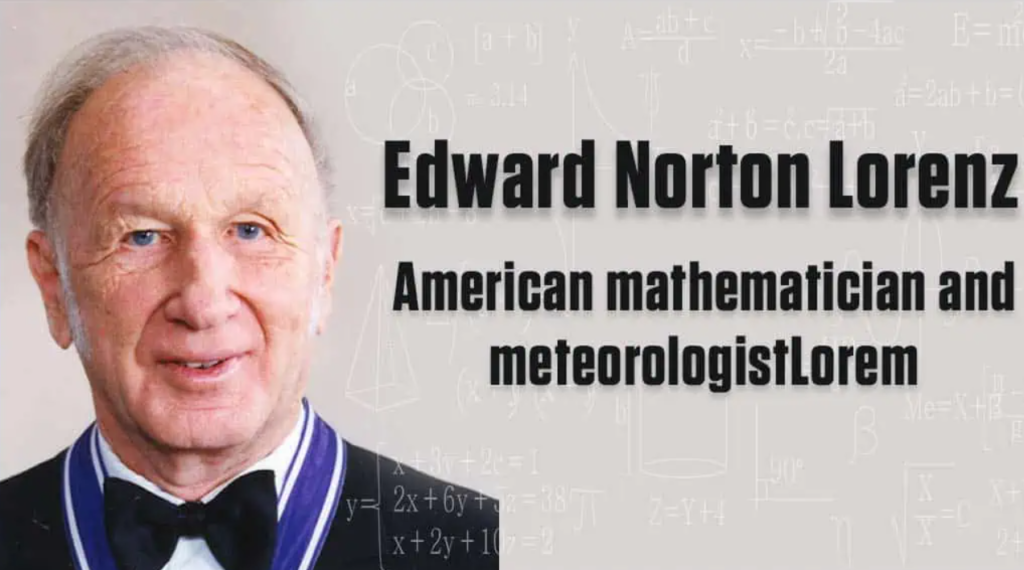
Edward Norton Lorenz is known for developing the “Butterfly Effect” concept.
He illustrated this concept with an example, explaining that the formation and path of a tornado could be influenced by seemingly insignificant factors—like a butterfly flapping its wings weeks earlier and thousands of miles away. This is why it’s called the “Butterfly Effect.”
Essentially, this idea underscores how the present is extremely sensitive to initial conditions from the past—where a minor variation in one event can have far-reaching consequences later on. This concept has been explored in various cultural works, with the 2004 film “The Butterfly Effect,” starring Ashton Kutcher and Amy Smart, being among the most well-known.
Directed by Eric Bress, this film has become a defining work on the topic.
It presents the notion that, if time travel were possible, even the smallest actions could create chaos in the universe. Imagine you traveled back in time to visit a serene German town, far removed from the hustle and bustle of modern life. While there, you engage in a brief, casual conversation with a woman in a park. A man, assuming you two are together, passes by without a second glance.
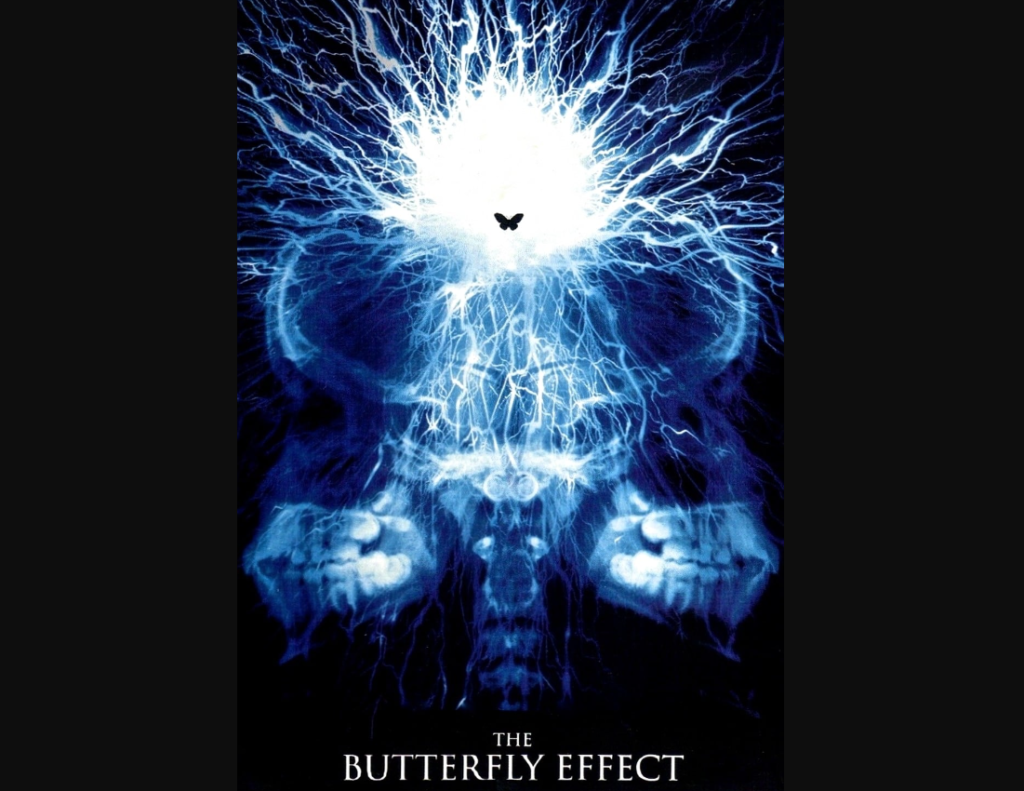
It seems like a trivial interaction, right? But what if I told you that this woman and the man who walked by were destined to be Albert Einstein’s parents? Because of your short conversation, they never meet, and history is altered forever.
With this explanation in mind, let’s explore how chess has played a role in shaping our world’s history. We’ll also imagine how different the world might be if certain key moments involving chess had unfolded differently.
CHRISTOPHER COLUMBUS: THE BIRTH OF ‘INCALAND’
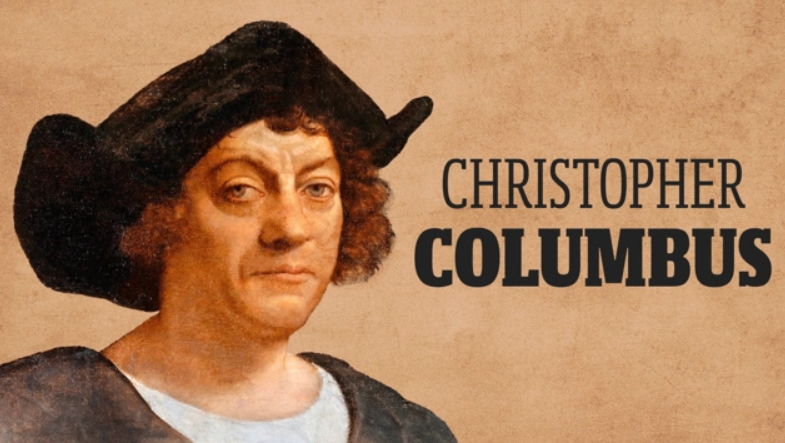
Christopher Columbus is often credited with the discovery of America under the Spanish crown. Born on August 25, 1451, Columbus was an Italian navigator from the Republic of Genoa who embarked on four voyages across the Atlantic Ocean, establishing the first known European contact with South America. However, what many may not realize is that chess played a pivotal role in Columbus securing the approval to embark on his legendary journey.
Just like modern businesses seek investors, Columbus faced significant challenges in finding sponsors for his ambitious plan. His goal was to establish a new route to Asia by sailing west across the Atlantic, thereby avoiding the Ottoman-controlled route through Constantinople.
Initially, Columbus presented his plan to King John II of Portugal, a leader of the maritime world at the time. However, the king rejected the proposal, opting instead to explore a route to India around the African continent.
Following this setback, Columbus relocated to the Kingdom of Aragon and Castile (modern-day Spain) around 1485. After pitching his idea to King Ferdinand II of Aragon, the proposal was once again rejected. Yet, with Queen Isabella of Castile’s support and belief in the project, Columbus persisted, waiting for the right moment to bring the proposal back to life.
Queen Isabella I of Castile, also known as Isabel la Católica, was instrumental in aiding Columbus with his venture.
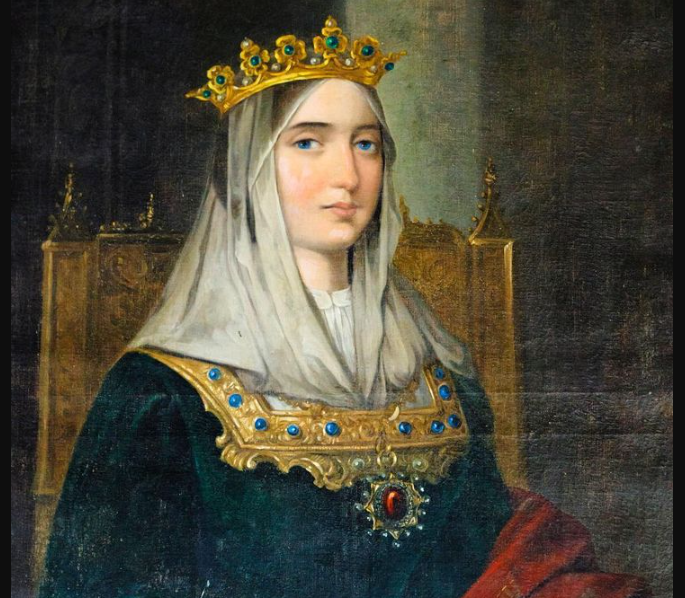
This is where chess enters the story. According to Hernando del Pulgar, King Ferdinand’s secretary, the king was an avid chess player, frequently competing against his “regular opponents,” including the royal chaplain Juan Rodríguez de Fonseca.
One afternoon, as Ferdinand engaged in a chess match, he was asked if a decision had been made on Columbus’ proposal. Irritated, he postponed the answer until after the game. At the time, Ferdinand’s position on the board seemed dire, and Isabella recognized that the moment wasn’t ideal. She waited patiently, hoping for a shift in fortune.
That moment came unexpectedly. Just when the king was on the verge of conceding, Queen Isabella noticed a winning strategy. She quietly approached Ferdinand and pointed out that he had a checkmate in five moves. Energized by her insight, Ferdinand began to analyze the position and soon executed the correct moves.
King Ferdinand II of Aragon vs. Juan Rodríguez de la Fonseca
1-0 for the Kingdom of Aragon and Castile
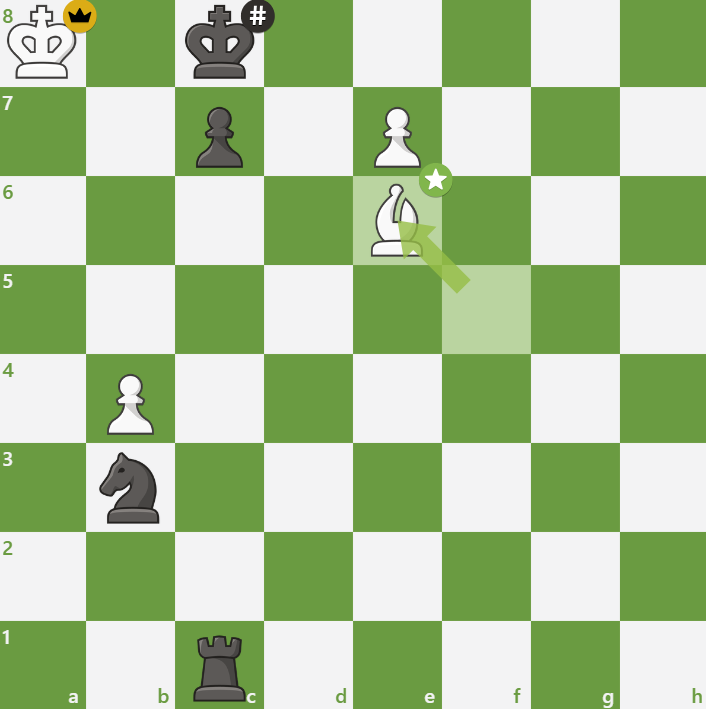

Once Ferdinand triumphed in his game, his spirits lifted, and he promptly agreed to Columbus’ proposal. Queen Isabella immediately informed Columbus of the positive outcome, setting in motion the events that eventually led to the discovery of the New World.
The solution to Ferdinand’s chess game was clear once the idea was revealed, with every move being forced. Thanks to this victory, history was forever changed.
NAPOLEON BONAPARTE: THE FINAL DOWNFALL OF FRANCE
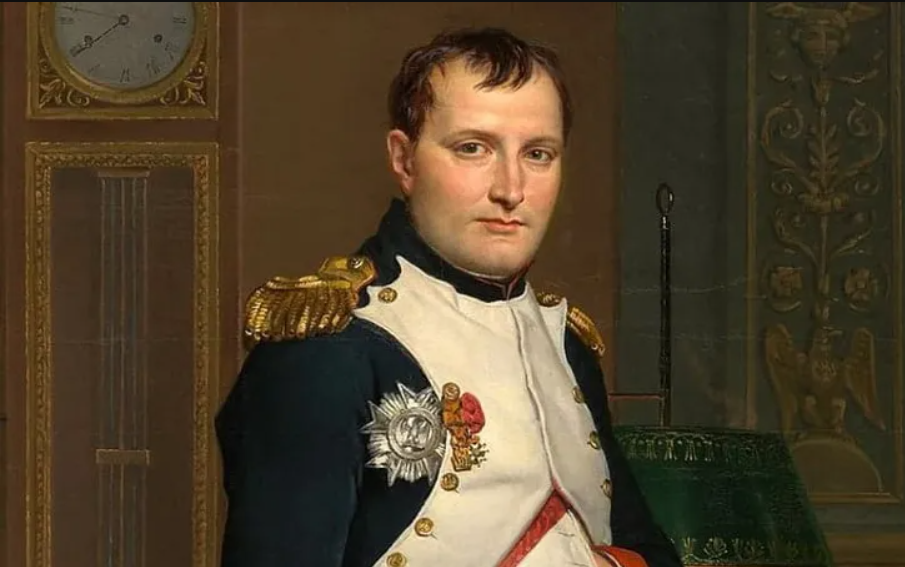
Napoleon Bonaparte, also known as Napoleon I, stands as one of France’s most iconic historical figures. Born on August 15, 1769, and passing on May 5, 1821, he was a political leader who rose to power during the French Revolution. From 1799 to 1804, Napoleon led the French Republic, before declaring himself Emperor of the French Empire, expanding his influence until his eventual defeat in 1814.
After initially supporting the French Revolution in 1789, Napoleon commanded numerous victorious military campaigns across Europe between 1796 and 1814, in what are now called the Napoleonic Wars. His significant victories, including the famed Battle of Austerlitz, led to the dismantling of the Holy Roman Empire, making him a national hero.
However, in 1812, his ill-fated invasion of Russia resulted in a disastrous retreat during the harsh winter. Following this, Prussia and Austria joined forces with Russia, decisively defeating Napoleon at the Battle of Leipzig. Paris was captured, and Napoleon was forced to abdicate in April 1814. Exiled to the Mediterranean island of Elba, Napoleon managed to escape and return to power in February 1815 in a period known as the “Hundred Days.” His renewed reign was short-lived, as his enemies formed the Seventh Coalition, which defeated him at the Battle of Waterloo in June 1815. He was then exiled to the distant island of Saint Helena in the South Atlantic, where he lived out the remainder of his days, passing away in 1821.
Napoleon’s Connection to Chess
Napoleon was an enthusiastic chess player, though there is ongoing debate about the authenticity of some of his recorded games. Despite these controversies, many of his games have been preserved in chess books and databases. While in exile on St. Helena, he frequently played chess with General Bertrand.
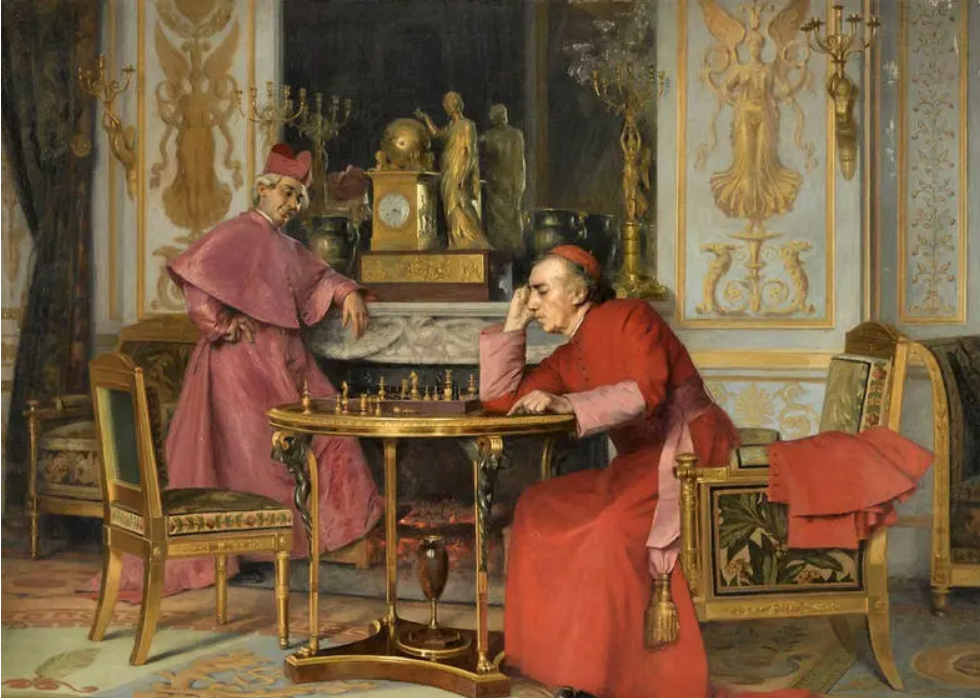
One of the most curious stories involving Napoleon and chess is his encounter with the famous “Mechanical Turk” during a visit to Vienna in 1809. According to accounts, Napoleon deliberately made illegal moves during their match. In response, the machine waved its arm and knocked the chess pieces off the board, much to his amusement. Afterward, he played a proper game, eventually resigning after nineteen moves.
Here’s a famous game Napoleon played in 1804 against Claire, Comtesse de Rémusat:
The position becomes dangerous as the king is overly exposed. Sacrificing yet another piece leads to a forced checkmate.
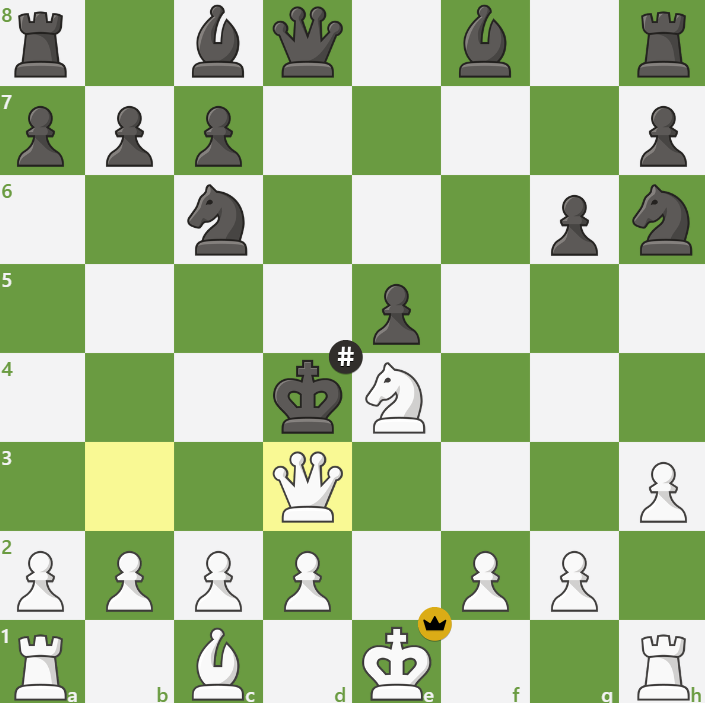

A Hidden Secret on St. Helena
Now, for the twist in history. Legend has it that during his exile on St. Helena, Napoleon’s supporters secretly sent him a chess set made of ivory pieces. Hidden within this set was a meticulously detailed escape plan. As his love for chess was well known, the plan would not raise suspicion. Unfortunately, despite playing many games with the set, Napoleon never uncovered the hidden secret, as the officer entrusted with delivering the set and revealing its contents died en route to St. Helena. Thus, an opportunity for freedom slipped through his fingers.
ALAN TURING: A GENIUS WHO PAVED THE WAY FOR SAVING SPECIES
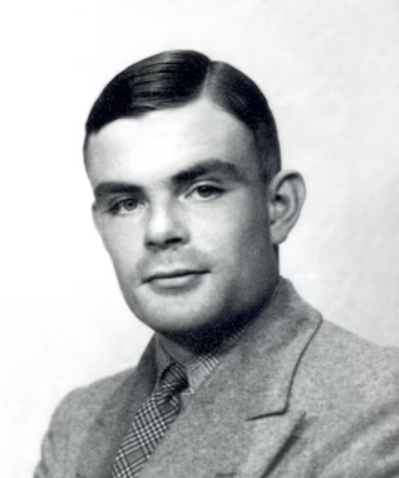
Alan Turing, often hailed as the father of computer science, made monumental contributions that shaped the modern world. Born on June 23, 1912, and passing on June 7, 1954, this English mathematician and logician is regarded as one of the brightest minds of the 20th century. He revolutionized the field of computation and algorithms with his invention of the Turing machine, a foundational model for today’s computers.
But how does chess connect to Turing’s legacy? Turing saw chess as an excellent platform for pioneering research in artificial intelligence (AI). In fact, he created Turochamp, the world’s first chess program, in 1948. Though it wasn’t completed due to technological limitations, Turochamp marked a critical step forward in the early stages of AI research. Designed as more than just a chess-playing algorithm, it represented a broader investigation into machine learning and computation. Despite its low skill level in gameplay, it could play full games against human opponents.
In a notable match, Turochamp faced Alick Glennie on March 15, 1952, in Manchester. After a chaotic and error-filled game, Glennie seized an opportunity when Turochamp left its queen vulnerable and ultimately won. Although Turochamp wasn’t a great player, it laid the groundwork for many advancements in AI.
While it’s an exaggeration to say that without Turochamp there would be no AI, its influence was undeniable. Turing’s work continues to shape modern AI, even in unexpected ways.
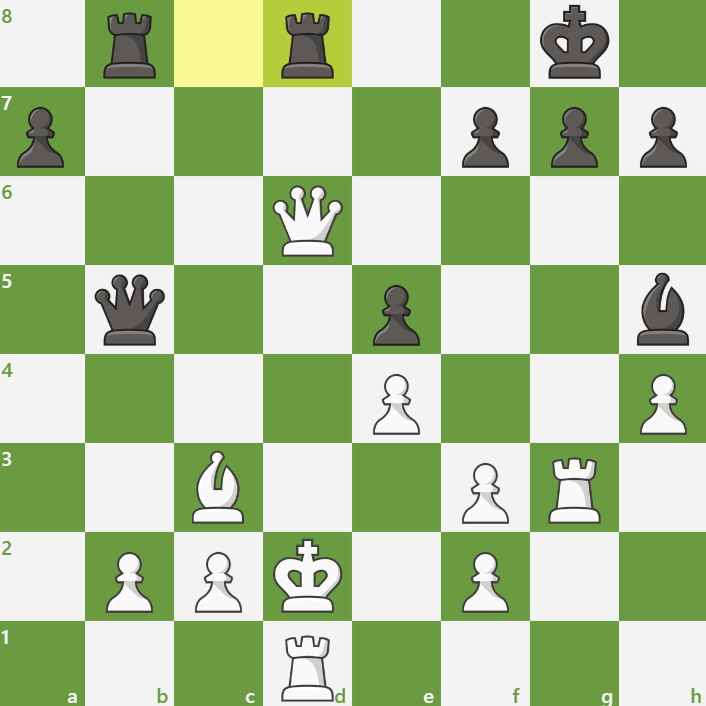
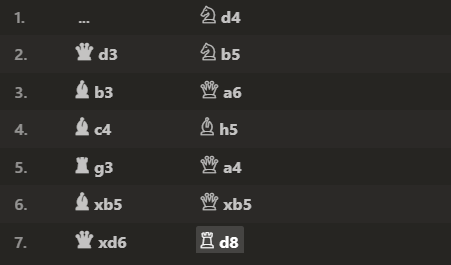
For instance, in 2020, Air New Zealand launched a project that utilized AI to optimize aircraft turnaround times—the interval from when an airplane arrives at the gate until it departs again. I was fortunate enough to contribute to this project, which was partly built upon the principles that Turing had applied in creating Turochamp. While I can’t delve into the technical specifics, I can confirm that this innovation has significantly reduced delays at Auckland Airport.
This reduction in delays has had broader implications. Tourism is vital to New Zealand’s economy, and the income generated helps fund conservation efforts to protect endangered species, such as the Kākāpō, a flightless parrot native to the country. Thanks to advancements in AI inspired by Turing, even these adorable creatures benefit from the seamless operations of the tourism industry.
Charlemagne: A Blunder Decides the Fate of Europe
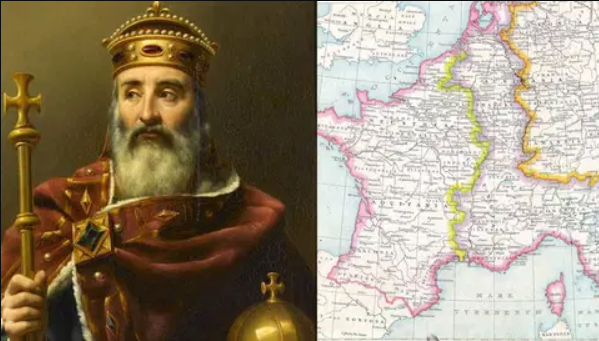
Charlemagne, the illustrious ruler of the Carolingian Empire, was born on April 2, 748, and reigned as emperor from 800 until his death on January 28, 814. He unified much of Western and Central Europe, becoming the first emperor in the West since the fall of the Roman Empire over 300 years earlier.
His reign brought significant political and social reforms. Charlemagne’s influence reshaped Europe through advancements in administration, law, education, military organization, and religion, setting the foundation for the Middle Ages. His leadership also enabled the cultural revival known as the Carolingian Renaissance. However, his new imperial status also put him at odds with the Byzantine Empire.
A legendary tale surrounds Charlemagne and a set of chess pieces said to be a gift from Caliph Harun al-Rashid. These pieces featured elephants instead of bishops and chariots in place of rooks, suggesting they may have played Shatranj, an early form of chess. While this story is unverified, it hints that chess might have been introduced to Europe earlier than previously thought.
The chess pieces known as the “Charlemagne chessmen” date back to the 11th century, but the story I want to share is a different, likely fictional, yet captivating anecdote.
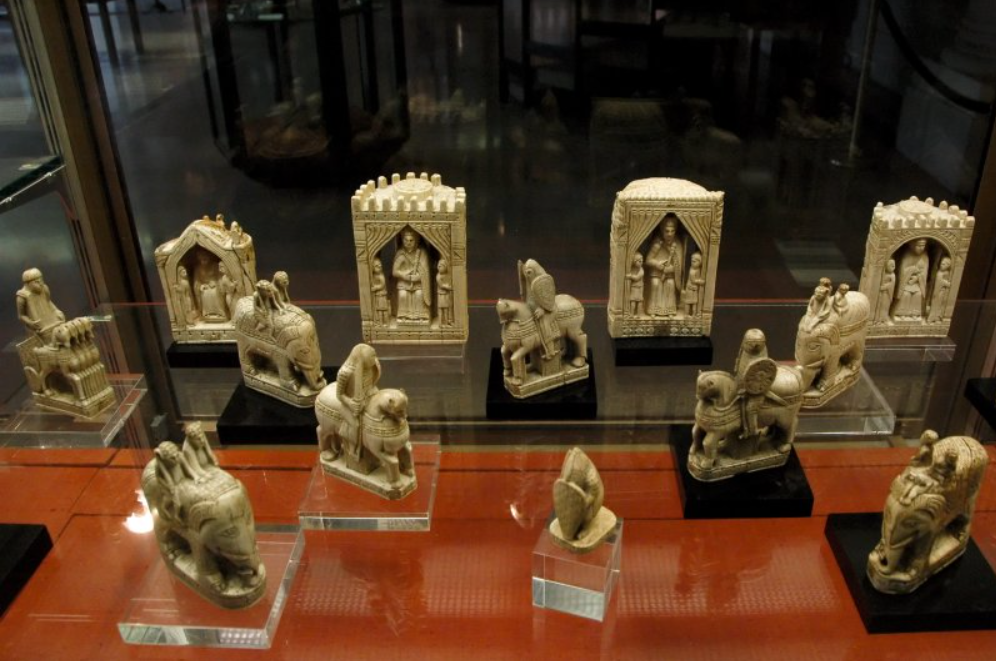
It involves a courageous soldier named Garin, who served Charlemagne with distinction, earning admiration from fellow knights and the affection of many women, including the Empress herself. Garin, loyal to his emperor, rejected her advances. The remorseful Empress confessed to Charlemagne, who then proposed a chess match with a perilous wager: “If you win, I will give you my entire kingdom and my wife. If I win, you will forfeit your life.”
Garin, unable to refuse, accepted the challenge. What Charlemagne didn’t know was that Garin was a chess prodigy. With a brilliant queen sacrifice akin to the famous Légal trap, Garin outmaneuvered the emperor and delivered a checkmate.
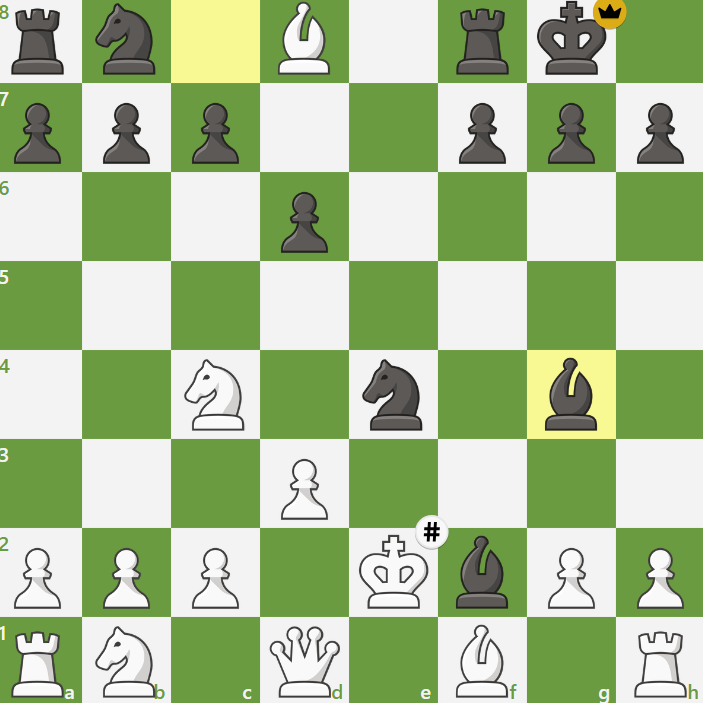
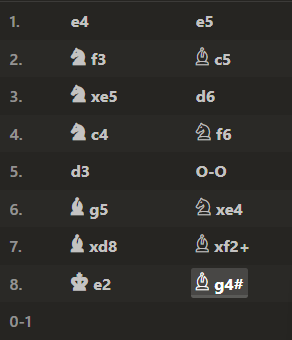
Dejected by his loss, Charlemagne said, “Garin, take what I have promised.” But Garin, ever loyal, declined the reward, allowing Charlemagne to continue his reign.Thus, in this tale, a game of chess nearly altered the fate of Europe.
Benjamin Franklin: An Interrupted Revolution
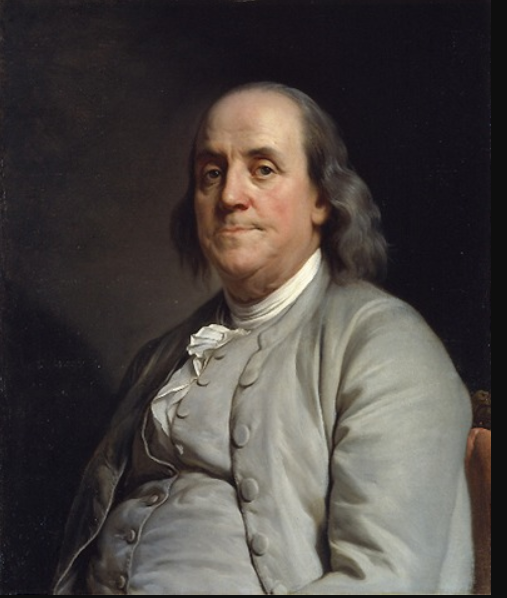
Benjamin Franklin, one of the Founding Fathers of the United States, was born on January 17, 1706, and passed away on April 17, 1790. Renowned as an American writer, scientist, inventor, statesman, diplomat, printer, publisher, and political philosopher (quite the résumé), Franklin was one of the most influential minds of his era. He helped draft and signed the Declaration of Independence in 1776, cementing his legacy as a key figure in American history.
Franklin was also the first known chess player in the American colonies and was posthumously inducted into the U.S. Chess Hall of Fame in 1999. He often used chess as a cover for secret meetings aimed at securing allies for the American Revolution. Thanks to his efforts, France entered the war, which ultimately helped the colonies win their independence from Britain.
In December 1774, Franklin traveled to England as a diplomat, using the opportunity to engage with strong chess players. One of his challengers was Lady Caroline Howe, and as noted by historian Prof. George Allen, she defeated Franklin rather easily—partly because he wasn’t particularly skilled at the game. Did this loss frustrate him? It’s worth pondering.
“[…] he found his match in this English woman, who beat him soundly and easily. So, Franklin should be remembered more for his passion for chess than for his skill.”
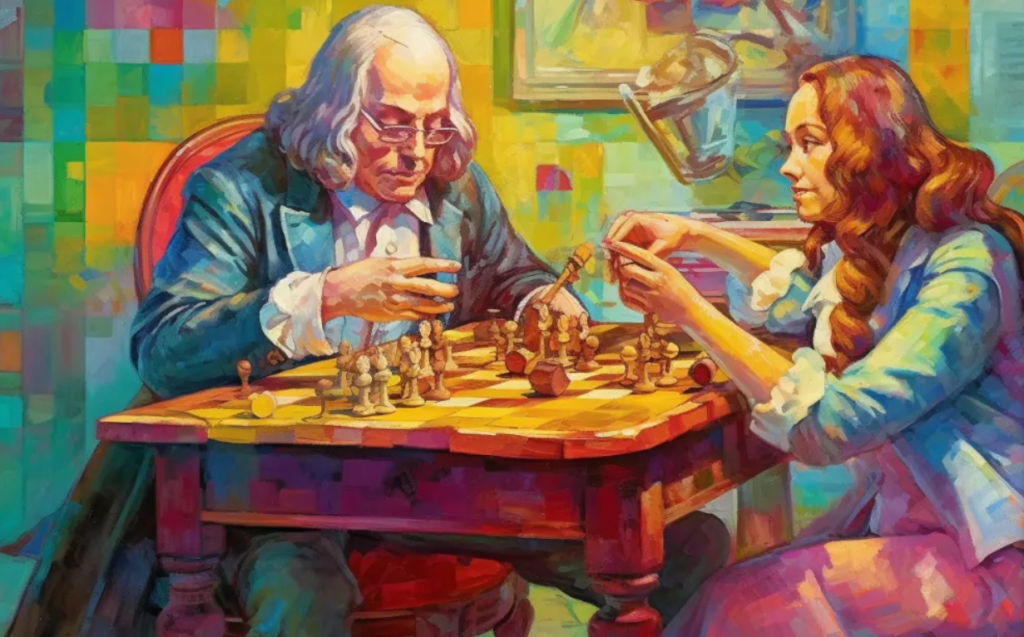
Lady Howe, who checkmated Franklin, also introduced him to her brother, Rear-Admiral Lord Richard Howe, the British navy’s commander in North America. Determined to avoid conflict, Lord Howe arranged secret meetings disguised as chess games between Franklin and his sister from late 1774 until March 1775, hoping to negotiate peace. However, no significant progress was made.
A year later, in 1776, after the Continental Congress declared independence, Lord Howe made one last attempt at peace. He bypassed the Congress, addressing a letter directly to Franklin, calling him “my worthy friend” and referencing their chess games. Howe expressed hope that he could help bring about lasting peace.
Franklin, however, replied angrily on July 30, just three days before the signing of the Declaration of Independence, firmly rejecting the offer: “It is impossible that we should think of submission to a government whose atrocious injuries have extinguished every remaining spark of affection for that parent country we once held so dear.”
Conclusion (And a Chess Example)

I hope you enjoyed reading this piece. The primary aim wasn’t to explore the absurd futuristic scenarios mentioned earlier—most of which are likely just legends or exaggerated for fun. Instead, the goal was to use a familiar concept to engage readers and offer a chance to learn something new. It’s fascinating to think that some of history’s most influential figures, who shaped the world, also enjoyed a game of chess when they weren’t busy making history. A big thanks to my friend @Victor_Stepko_4 for his help.
The “Butterfly Effect” applies to chess as well. In the 1892 World Championship, Mikhail Chigorin found himself in a winning position against Wilhelm Steinitz. A victory would have leveled the match and given him a psychological edge for the title! However, one fateful moment may have altered the course of chess history. With the blunder 32. Bb4 (??), Chigorin handed his opponent a mate in two, marking one of the worst blunders in chess history.
What if the outcome had been different? Could Chigorin have become world champion? Would Emanuel Lasker have beaten him in 1894? And would Chigorin’s playing style have influenced the future of chess? We will never know.
Mikhail Chigorin vs. Wilhelm Steinitz
0-1
1892 World Championship Match
Havana, Cuba, February 28, 1892, Round 23
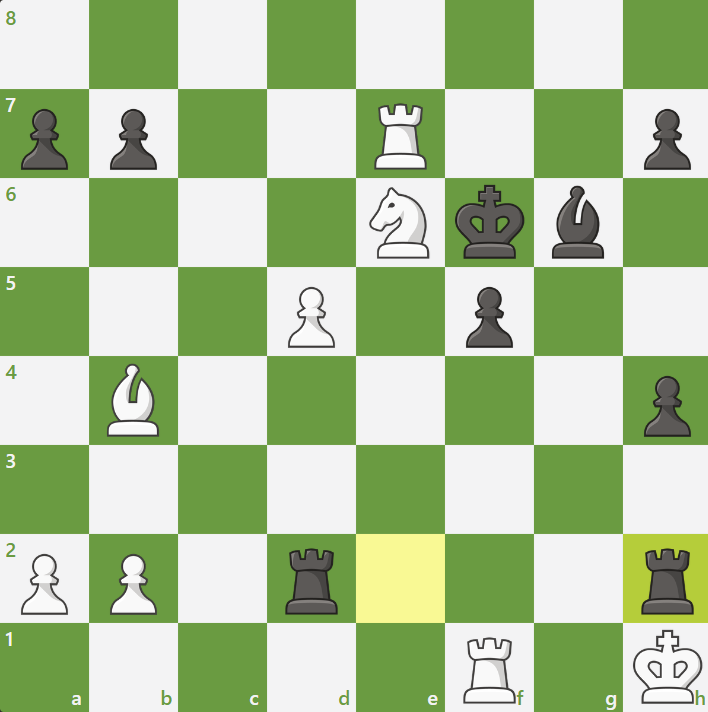
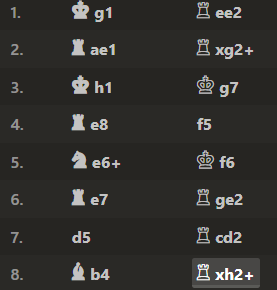
At that critical moment, modern analysis suggests White had an advantage of about +3.0. But with the fatal move, Chigorin drastically shifted the game, allowing Steinitz to checkmate in two moves and retain his title. Seizing the opportunity, Steinitz clinched victory, and Chigorin resigned.
To wrap up this article, I want to remind you that the “Butterfly Effect” isn’t just about major historical events; it’s also present in our daily lives. A seemingly small decision you made years ago may have drastically changed your path, leading to a completely different outcome than if you had made another choice.
Think about it—if you hadn’t decided to go to a certain place, you might never have met the love of your life. If you chose a different major in college, you could have ended up with different jobs, friends, homes, and even a different personality. Ultimately, we are the result of our choices, and sometimes the smallest decisions are the ones that define who we become.
Note: This text is for entertainment purposes only. Feel free to join in and share your own thoughts on what might have happened. Just remember, this is a chess blog—not an academic article—so kindly avoid treating my predictions like scientific theories. Enjoy!
© 2024 The Madras School of Chess
Created by Webdzo